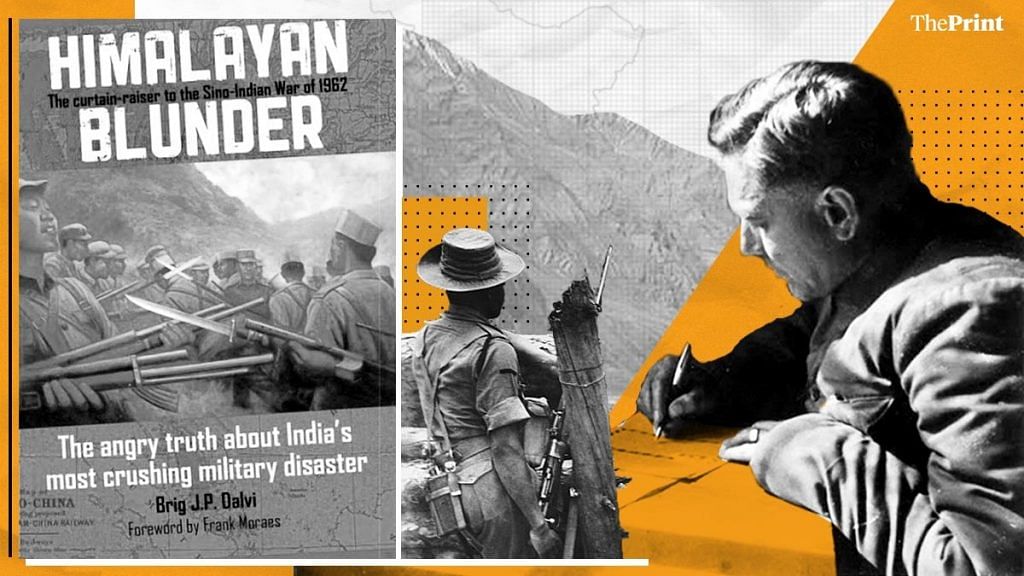New Delhi: As India and China remain in a tense standoff along the Line of Actual Control (LAC) in Ladakh, the words of Late Brig J.P. Dalvi (retd), who wrote a scathing book bringing to light the fault lines of the country’s political and defence leadership that led to the defeat in the 1962 War, ring aloud on his 100th birth anniversary.
“1962 was a National Failure of which every Indian is guilty. It was a failure in the Higher Direction of War, a failure of the Opposition, a failure of the General Staff (myself included); it was a failure of Responsible Public Opinion and the Press. For the Government of India, it was a Himalayan Blunder at all levels,” the Brigadier, who was taken prisoner of war (PoW), wrote in his book Himalayan Blunder.
The family of the Late Brigadier observes his 100th birth anniversary Friday.
“He was a battle-hardened soldier and I used to always call him Sir. His life was about his ‘paltan’. For him, my mother and I came afterwards,” Michael Dalvi, his son, told ThePrint on the phone from Dehradun.
Born in Basra in Iraq, the senior Dalvi was just 21 when he joined the Army.
“He was posted to Burma to fight against Japan in World War II. He spent four and half years there in the jungles which toughened him,” Michael said.
In 1962, when the India-China War broke out, Dalvi was commanding the 7th Infantry Brigade in the North-East Frontier Agency, now Arunachal Pradesh.
Dalvi’s book shows how the Indian political and military leadership failed to read the Chinese mind despite all the evidence around and later sent ill-equipped soldiers with World War I .303 Lee-Enfield 10 shot bolt action rifles, without any planning, to fight the Chinese who were in much larger size and armed with AK47s.
“I only hope those who currently control and conduct the destiny of our great country, and our unquestioning uniformed bravehearts learn from the hindsight of history,” wrote his son in an article on his father’s 100th birth anniversary.
Also read: India’s options against China shrink to two — limited war or another Wuhan
‘We had to clear ourselves of the charge of having been brainwashed’
In his book, the senior Dalvi wrote, “The Chinese had lit the fuse on 8 September by intruding into the Thagla Ridge area but this was not treated as a prelude to full scale invasion. It was dismissed as yet another minor border incident which “could be localised and dealt with firmly’”.
The Brigadier wrote that when they were repatriated on 3 May, 1963, he and his 23 fellow soldiers were greeted with correct military protocol, tinged with a chill reserve.
“It was only later that I found out that we had to clear ourselves of the charge of having been brainwashed — a strange charge from a Government which had itself been brainwashed into championing China’s cause for more than a decade without a doubt the prisoners had been declared outcast,” he wrote.
As journalist Frank Moraes wrote in the foreword for the book, Dalvi narrates the manner in which India’s own political leadership traitorously worked against its cause.
“In no uncertain terms, he holds three men responsible for India’s defeat – Jawaharlal Nehru, Krishna Menon, and General Brij Mohan Kaul.
“Issuing orders from Delhi, they seemed to be clueless about the situation on the battlefield. Undoubtedly, when they were rushed into battle, the Indian soldiers – underfed, ill-equipped, and unprepared as they were – never stood a chance against the powerful Chinese army. Regardless of that, the soldiers fought bravely and laid down their lives for their homeland,” he wrote.
Also read: LAC row began April, 5,000 Chinese troops sent to Pangong in May, claims state broadcaster
